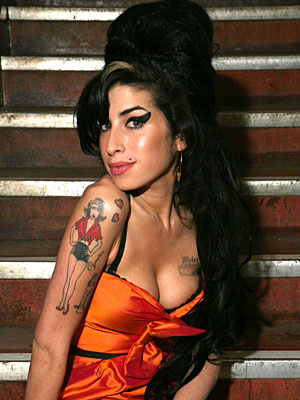
Just yesterday, August 25th, marked the 10 year anniversary of R&B Artist and Actress Aaliyah, who was killed in a plane crash after finishing a shoot for single "Rock the Boat" out at Marsh Harbour, Abaco Islands. The plane had been over its maximum takeoff weight. To commemorate her death, Rolling Stone reissued an article released the year of her death. Her albums and singles sailed up the Billboard charts. Even Pitchfork posted a remix of Aaliyah's "Are You That Somebody" done by Glasgow producer Hudson Mohawke.

A little over a month ago on July 23rd, soulfully tragic singer Amy Winehouse's death made headlines worldwide, leaving millions speculating that drugs might have been involved. The singer's 2007 album "Back to Black", featuring the hit "Rehab" won the UK Singer 2008 Grammys for Song of the Year, Best Female Pop Vocal Performance, Best Pop Vocal Album and Record of the Year. Her life was plagued by a terrible struggle with drug and alcohol addiction, a controversial marriage to Blake Fielder-Civil, and mental health issues--all of which were reflected in her music. Sadly, many feel that she got too big too quickly and could never again have achieved the success of "Black to Black" even had she managed to fight her demons. SHe joined the "27 Club", along with Kurt Cobain, Janis Joplin, Jim Morrison, Jimi Hendrix and others. Following her death, record sales went up and yesterday she reached the top of the charts once again in the UK. The MTV VMAs plan to honor her with a special performance at this sunday's award show.

It doesn't take a rocket scientist to figure out that when there are tragic celebrity deaths, post-humous sales kick in and headlines are made. When the King of Pop, Michael Jackson, passed away it was an international tragedy, with his music playing in every store, nightly news specials, a televised funeral and "This Is It", a movie featuring footage of performance material that would have been included in his upcoming and final tour. His death was talked about for months in summer 2009 and afterward as his album sales resurged and MTV even returned to its old format to screen his most famous music videos.
Countless examples of reissues, promotional DVDs, and other memorabilia surrounding music celebrity deaths can be found. Today, Rolling Stone reports on the 20th Anniversary Reissue of Nirvana's 'Nevermind', which of course helps to immortalize the late Kurt Cobain and his contributions to the birth of '90s Grunge Rock.
I can't say that I'm not part of the post-humous phenomenon. I quickly Youtube'd Aaliyah's video for "Rock the Boat" to get a glimpse at the artist's final moments. I perused the net for Winehouse's final live appearance at the iTunes Festival in London and bought "Back to Black" on vinyl. The King of Pop was with me on my iPod every day I commuted from New Jersey to New York in summer 2008, and I feel an interesting melancholy every time I play "Human Nature".
There is something sadly fascinating about revisiting an artist's music if they are gone too soon. What makes musicians so unique is that they have the ability to create and be a part of something that can immortalize them forever. While the media definitely takes advantage of celebrity deaths to sell and resell products, it is worthwhile to revisit the music of those who have passed on. Whenever I put on a track by an artist, it's a piece of themselves that they left behind for us to hear and remember them by. It becomes an elegy of sorts, that can be experienced again in a new and deeply profound way.




